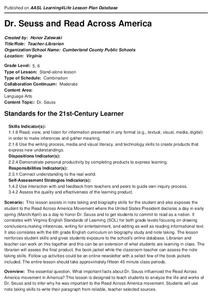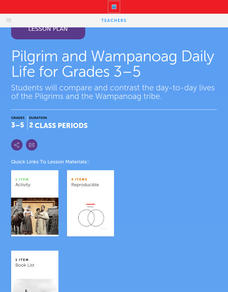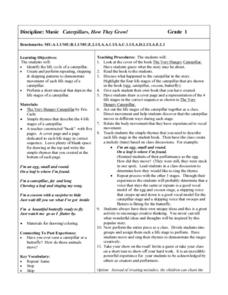DePaul University
Settlement
Early settlers in the American Midwest experienced constant struggle. This reading passage describes for young learners the hardships of homesteaders as they journeyed west and sought to start a new life. When finished, students identify...
Have Fun Teaching
Making Inferences Something Special (13)
Work on making inferences with a reading passage and comprehension questions. After kids read a short paragraph about Jalisa's birthday, they infer why she would be excited about receiving gifts from her brother.
Texas Center for Learning Disabilities
Second-Grade Explicit Intervention
Unfortunately, not all students learn to read at the same pace, but with the help of this resource, you can ensure that they all receive the support they need to reach this important goal. Comprised of short literacy activities, these...
Texas Center for Learning Disabilities
Second and Third Grade Explicit Phonics Intervention
Support all young learners on their journey to literacy with this five-lesson reading intervention unit. Following a clearly outlined format, each lesson first engages children in practicing their phonemic awareness and phonics skills...
Curated OER
Dr. Seuss and Read Across America
What important facts about Dr. Seuss influenced the Read Across America movement...? This is the driving question of a research project that requires scholars to find information about Dr. Seuss' life and work. Class members write a...
Texas Center for Learning Disabilities
Fifth-Grade Text-Based Intervention
Look no further—here's a resource packed with focused intervention materials for special education teachers. A unique unit plan provides 10 days of structured text-based intervention strategies for fifth-grade learners. Each 30-minute...
Scholastic
Pilgrim and Wampanoag Daily Life for Grades 3-5
Thirteen steps make up a lesson that challenges pupils to compare and contrast the daily lives of Pilgrims and the Wampanoag tribe. Learners revisit the Graffiti Wall then break into small groups for an investigative reading assignment...
Core Knowledge Foundation
First Grade Skills Unit 3
Four weeks, 19 lessons—this unit covers five new vowel spelling patterns, tricky words, spellings, verb tenses, reading fables and exploring the writing process. Lessons offer review, an introduction to the concept, skills practice,...
Core Knowledge Foundation
First Grade Skills Unit 5
Twenty-two lessons make up a unit that focuses on first-grade skills. Scholars examine spelling alternatives—their rules and patterns, practice tricky spelling and high-frequency words, explore plural nouns and sentences, read a...
Curated OER
Amazing Alphabet Lessons to Excite Your Little Learners
Wiggle, create, and recognize! Fun and engaging activities to reinforce phonemic awareness and pre-reading skills.
Curated OER
Reading Lessons for Alaska State Standards - Reading Rate and Fluency
Sixth graders read a given passage silently. The student then reads the same passage orally to a partner. The partner records the number of words pronounced incorrectly. The student then sets goals to increase oral reading speed and...
Curated OER
Guided Reading Lesson: Here Comes the Bus
Learners discover basic concepts of print. In this early literacy lesson, students discover basic high frequency words. Learners make predictions as they read. Cross-curricular activities provided.
Curated OER
Early Humans
Sixth graders read about the different types of Humanoid. They examine the different cultural beliefs and their own personal beliefs about evolution. They research the species using the scientific theory about evolution.
Curated OER
Growth Stages 1: Infancy and Early Childhood
Young scholars explore biology by completing a human growth worksheet. In this child development lesson, students read assigned text about the human birth process and the ideal growth patterns for a child. Young scholars answer study...
Florida Center for Reading Research
Phonological Awareness: Phoneme Matching, Pack-a-Backpack
Scholars sort words based on their initial phoneme or sound. Learners are given two backpacks, each with a picture card; they search and match picture cards with the same initial sound as the ones on each backpack.
Learning for Justice
Mary McLeod Bethune
Young historians conduct a close reading of the text of an interview with Mary McLeod Bethune, the daughter of former slaves who taught herself to read, grew up to establish schools for other Black women, and went on to become an advisor...
Tennessee State Museum
An Emancipation Proclamation Map Lesson
Did the Emancipation Proclamation free all slaves during the Civil War? Why was it written, and what were its immediate and long-term effects? After reading primary source materials, constructing political maps representing information...
Curated OER
Do You Want to Be My Friend?
Learners participate in a variety of emergent and early-literacy activities based on a "friendship" theme. Learners listen to the book Do You Want to Be My Friend by Eric Carle, then echo read, choral read, and independently read...
Curated OER
Phonics: Decode and Write Words with the “Silent e”
What happens when I add an 'e' to the word mad? It becomes made! Decoding and writing words with the silent e is the lesson for today. The class discusses what the e can do to a cvc word, then they practice adding e's to various words in...
Curated OER
Phonemic Awareness: Phoneme Blending
This resource is more of a suggestion than a full lesson. It explains how young pre-readers can work with their teacher to practice blending phonemes to make words. The class watches the teacher as she says and orally segments a word...
Curated OER
Phonemic Awareness: Segmenting
You ever feel like your going in circles? Because this instructional activity seems very much like others I've seen. First graders put up a finger as they count each phoneme the teacher emphasises as she says a series of words.
Smithsonian Institution
Borders and Community: Early 20th Century Chicago Neighborhoods and Ethnic Enclaves
Chicago is one city, four neighborhoods, and countless nationalities. The lesson explores the ethnic division of Chicago in the early twentieth century. Academics read primary sources, analyze maps, and tour an online exhibit to...
Lakeshore Learning
What's Next? Sequencing Story
First, next, then, and, finally are the words in focus of a sequencing lesson plan. Scholars listen to a read aloud of the tale "Lost in the Fog," and take part in a grand conversation about the story's sequence of events. They then show...
Curated OER
Music: Caterpillars, How They Grow!
Put on some music and get moving as a way to represent the life cycle of a caterpillar. Kids listen to the story The Very Hungary Caterpillar, discuss the life cycle, then create vocal expression that represent each stage of the cycle....

























